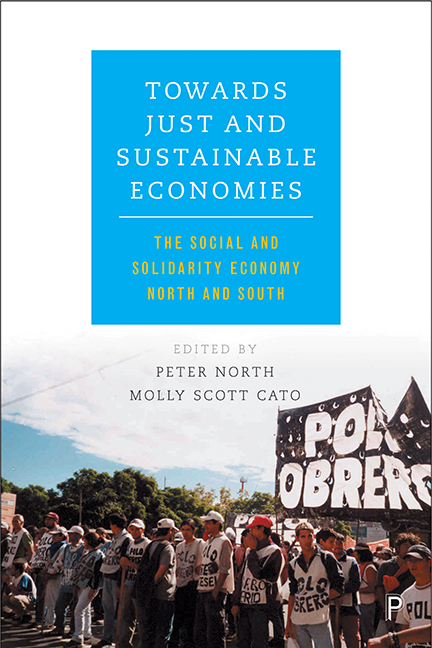Book contents
- Frontmatter
- Dedication
- Contents
- List of figures and tables
- Notes on contributors
- Acknowledgements
- One Introduction: new economies North and South – sharing the transition to a just and sustainable future
- Part I Theoretical perspectives on the social and solidarity economy
- Part II The social and solidarity economy as a site of social innovation
- Part III The social and solidarity economy and the state
- Part IV Policy translation between North and South
- Index
Sixteen - Conclusion: lessons learned and tensions exposed
Published online by Cambridge University Press: 05 April 2022
- Frontmatter
- Dedication
- Contents
- List of figures and tables
- Notes on contributors
- Acknowledgements
- One Introduction: new economies North and South – sharing the transition to a just and sustainable future
- Part I Theoretical perspectives on the social and solidarity economy
- Part II The social and solidarity economy as a site of social innovation
- Part III The social and solidarity economy and the state
- Part IV Policy translation between North and South
- Index
Summary
In this conclusion, we do not try to put an artificial coherence on what is still a conversation, while walking, talking and working together. We just raise some themes and questions, perhaps better questions than we had when we wrote the grant bid that led to this book. Different histories, politics and culture mean that Latin Americans and Europeans are starting from different places. Whether we think in terms of the contrast between the big-dealing suited men in the City of London and the social enterprise sector in Liverpool that is people-centred and where women play such an important role, or whether we think about the contrast between the massive high-rise developments of São Paulo and the small enterprises supported in a Brazilian favela by a solidarity economy incubator, the distances in terms of scale, scope and speed are huge. Are we realistically proposing that the edifice of global capital should be dismantled and replaced by a much larger number of homespun businesses run as cooperatives or social enterprises? A diverse economies and non-paranoid stance that refuses to concede overwhelming power to capitalism, and the emphasis on developing our power ‘to create the world we want to see’ offers a way out of this trap, in both the global South and North. It is the legacy the Zapatistas, piqueteros and land occupiers have given us.
As the chapters in this book show, Europeans are inspired by the creativity, energy and political focus of Latin Americans, especially in the current hard economic times that Latin Americans have experienced for much longer. The chapters demonstrate that scholars and activists in Latin America have pushed ahead much further and with wider public appeal in their efforts to develop deeper concepts of alternatives than their counterparts in Europe. That being the case, since we started these discussions, austerity and the Eurozone crisis have ground on, and we have seen significant levels of mobilisation in Greece and Spain (in particular) that suggest that these two countries might be societies in movement, while there have been setbacks in Argentina and Brazil. Of course, at the time of writing we cannot know what economic turbulence the UK is in for given Brexit. The climate crisis continues to be the elephant in the room where growth continues to be the object of economic development.
- Type
- Chapter
- Information
- Towards Just and Sustainable EconomiesThe Social and Solidarity Economy North and South, pp. 295 - 304Publisher: Bristol University PressPrint publication year: 2017

